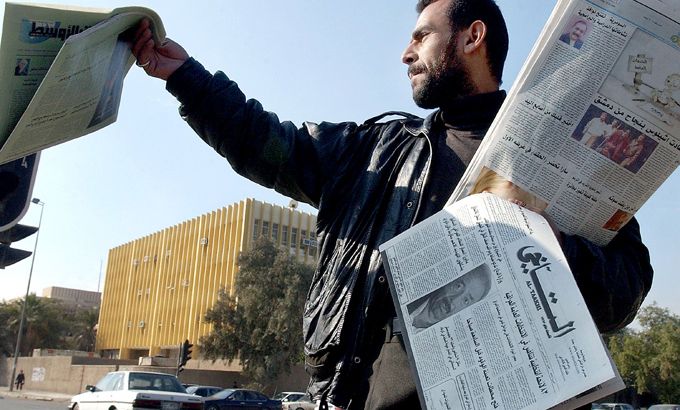
Iraq’s factionalised media
As Iraq negotiates a new coalition government, we look at how its notoriously factionalised media covered the story.
Iraq negotiates a new coalition government and at the Listening Post we take a look at how the country’s factionalised media covered the story. Also, we take a glimpse at the media on the tiny island of St. Helena in the South Atlantic.
It took eight months for the Iraqi government to finally reach an agreement on a power-sharing deal. The war-torn country is notoriously factionalised with a population divided by politics and religion and plagued by sectarian violence.
These divisions were very evident in the Iraqi media’s coverage in the lead up to the election. A channel’s partiality towards one political party turned into blatant prejudice against another and the media output that resulted was often divisive and sometimes potentially dangerous.
So in effort to deal with the media cacophony, the Iraqi Communications and Media Commission – set up in 2004 – entered the fray. When the commission started threatening to shut down outlets that incited hatred, many journalists in the country were left unsure of exactly what they could and could not say.
Our News Divide this week looks at the media’s role in the lead up to the election, what it may be like under the new power-sharing agreement and whether or not it will be able to put aside its differences without being censored.
In this week’s newsbytes: The Mexican ambassador to the US criticises the international media for having a one-sided narrative when reporting on his country; Newsweek, a popular weekly magazine and The Daily Beast, a popular news and opinion website merge after months of negotiations; the parents of the missing British girl, Madeleine McCann, sign a book deal and say that all the proceeds will be used to keep the search for their daughter alive; and the fastest selling video game ever has proven rather unpopular in Cuba ….
St. Helena is a tiny British Colony in the middle of the South Atlantic Ocean. For the more observant viewers out there, you may spot an anomaly in this report. Look closely at the printing press footage we used. You will see that both of the island’s newspapers are being printed on yellow paper. That is not normally the case. St. Helena is so remote that all of its supplies have to be shipped in on a monthly basis. When we were there, the printing paper usually used was left off the shipment, so they had to resort to yellow paper. Although supplies are a fundamental requirement for the island’s media, it is not a fundamental issue.
All the media on the St, Helena – which consisted of a newspaper and a radio station – used to be controlled by the government. Then in 2005, when The Independent and Saint FM were launched, the island had – for the first time in its history – a free media. But in a place that has never had to regulate column inches or airtime before, having independent outlets is proving a little more problematic than initially anticipated.
And finally, theonion.com is starting to feature fairly regularly in our Internet Video of the Week department. That is because the site is just so good at hitting the nail on the head when it comes to the media. This time it has held a satirical mirror up to a journalistic institution – Time Magazine – to show editors there just what the Onion thinks of their reporting. We hope you enjoy the show!
This episode of the Listening Post can be seen from Friday, November 19, at the following times GMT: Friday: 1230; Saturday: 0630; Sunday: 2030; Monday: 0300; Tuesday: 1400, 2330; Thursday: 0030, 0730.